
The Power of Note-Taking: 15 Reasons Why Note-Taking is Important
Why should you take notes? Check out these 15 ways that note-taking can boost your learning and productivity
Artificial intelligence is becoming more and more pervasive in our everyday lives, raising difficult ethical concerns. In this review, we’ll look into whether this Udacity course helps answer some of these.
E-student.org is supported by our community of learners. When you visit links on our site, we may earn an affiliate commission.
3.9 / 5
The "Ethical AI" course on Udacity offers an exploration of the ethical considerations inherent in artificial intelligence (AI) development and deployment. Through its practical approach, the course equips students with the knowledge, skills, and tools necessary to address complex ethical challenges in AI. The course covers a wide range of topics, including bias and fairness, privacy and data protection, accountability and transparency, and societal impacts. Additionally, students engage in hands-on projects, case studies, and collaborative exercises to apply ethical principles in practical scenarios.
Artificial Intelligence (AI) has seen great technological advancements in recent years, which are promising innovation and efficiency across various sectors. Yet, as AI continues to evolve, so too do the ethical questions surrounding its deployment and impact. Ethical considerations involve assessing the impact of technology on individuals, communities, and society as a whole. Without deliberate attention to ethical implications, technological advancements can inadvertently lead to harm, reinforce biases, infringe on privacy rights, or exacerbate existing inequalities.
The use of AI has to follow certain ethical principles that guide the development and deployment of AI systems, such as fairness and transparency. These ethical considerations surround data collection, storage, and usage in AI applications.
To see if there are answers to these difficult questions, we’ll be exploring the Ethical AI course on Udacity – one of the leading tech education platforms. Let’s dive in to see what this course has to offer.
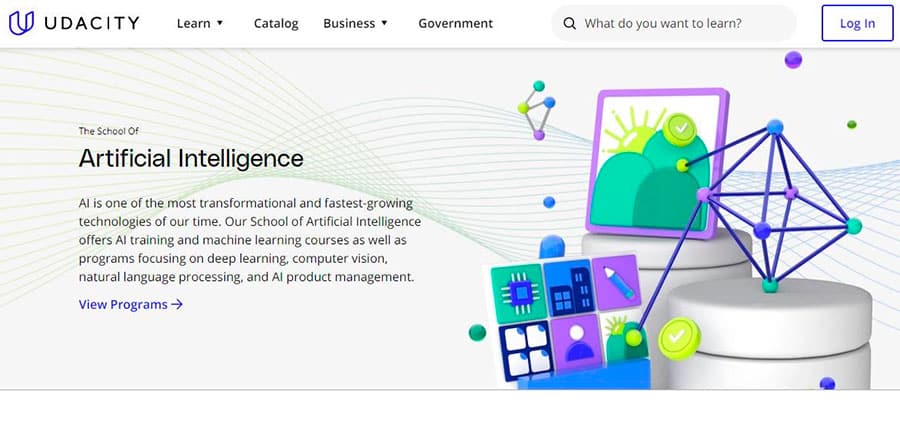
The Ethical AI course is an intermediate program split into six lessons connecting ethical AI concepts to critical issues in privacy, governance, transparency, and security. The course is designed primarily for AI practitioners to help them design and build models with enhanced fairness and limited bias to avoid unforeseen consequences.
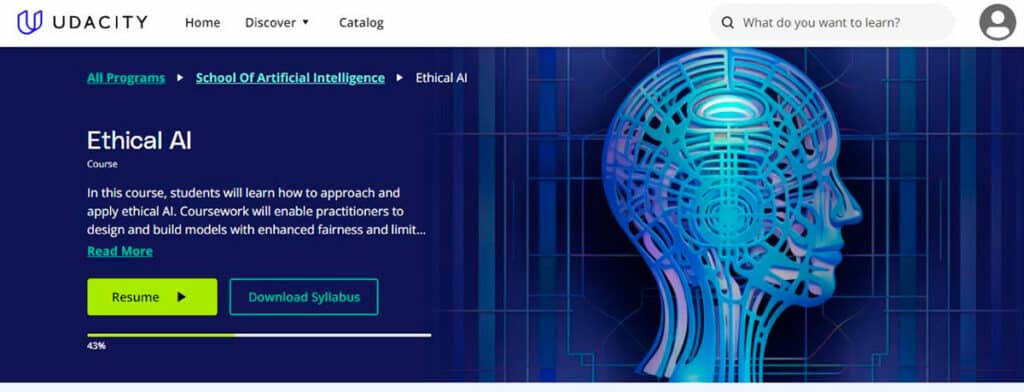
Learners will begin with acquiring ethical AI literacy skills that will enable them to engage in more meaningful discussions across AI disciplines and learn how to apply ethical AI principles to their organizations. The course then takes a more practical turn as students then learn how to implement technical measures toward bias, fairness, and explainability.
Note that the course requires students to have certain prerequisite knowledge, including knowing how to create machine learning models and efficient scripts using Python.
Ethical AI is offered by Udacity to help those already fairly well-versed in AI technologies to engage in more meaningful discussions on ethical considerations and how to approach them in practice.
The Udacity Ethical AI course is a one-course program divided into 6 lessons. The first lesson introduces learners to AI ethics and why it matters. Subsequent lessons teach the main principles and applications of ethics for the use of AI, including eliminating bias and ensuring transparency. The sixth lesson will require you to complete a project to test your skills in identifying the ethical impact of a use case.
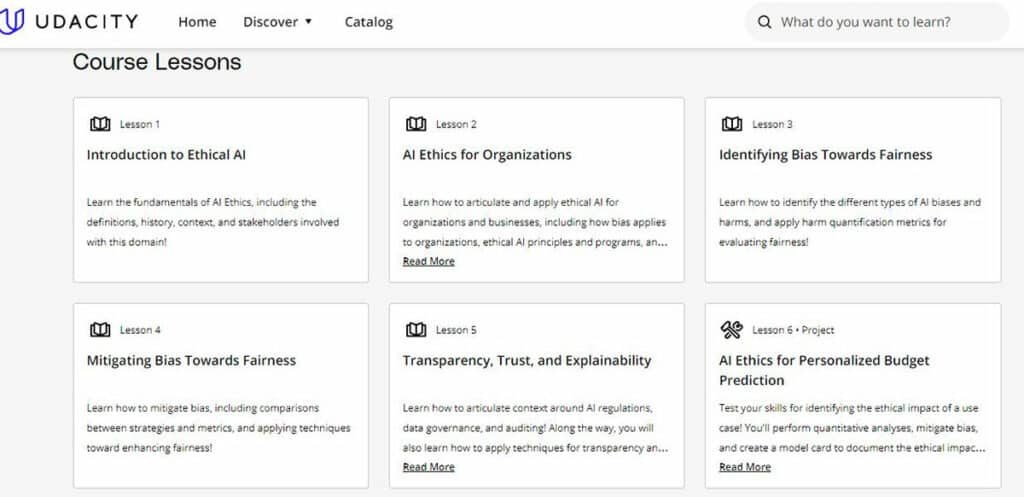
The courses are structured around video lessons, with the following features to make for a more interactive experience:

The Udacity Ethical AI course is divided into six lessons. Let’s have a look at them in more detail.
This lesson introduces the students to the meaning of AI ethics. You’ll get introduced to the several key terms that’ll be used throughout the course. Some of these include AI systems, autonomy of an AI system, data privacy, and many more.
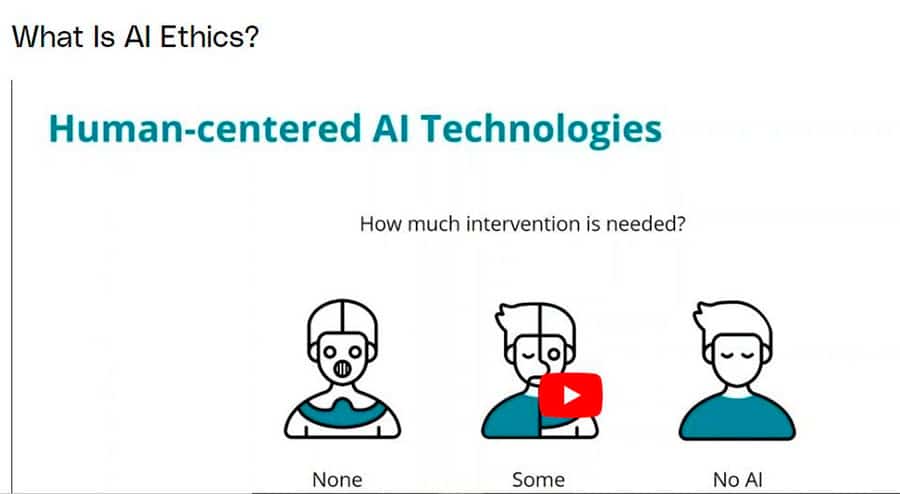
The lesson also highlights several instrumental thought experiments, research initiatives, and technology developments around AI and AI ethics-related efforts.
By starting with this, individuals get an overview of the main principles of AI ethics, which is instrumental to understanding the subsequent lessons.
This lesson aims to teach students the key ethical AI concepts and how to apply them in an organization. This section includes the implication of bias, the implication of fairness, and the ethical governance of AI.
In this lesson, you’ll look at where bias comes from in the AI lifecycle, the various types of bias, and their impacts in a professional environment. You’re also encourage to try to analyze the bigger picture by defining the problem statement of an AI system with fairness in mind.
The aim of this lesson is for users to gain a deeper understanding of what bias is in the context of AI, including how it can manifest in data, algorithms, and decision-making processes.You’ll also learn to identify different types of bias, such as algorithmic bias, data bias, and societal bias, and understand their implications for fairness in AI systems.
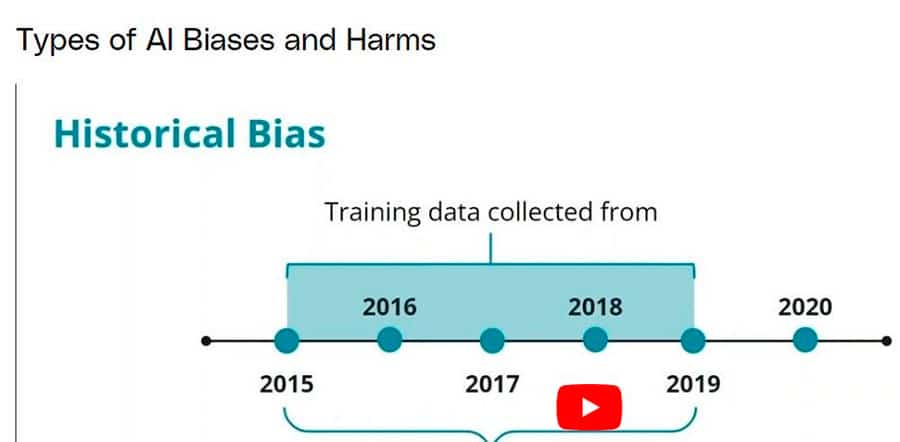
In this section, you’ll look at how to modify algorithms to reduce bias and promote fairness, including techniques such as algorithmic regularization and fairness constraints.
In this section, you’ll explore the benefits of transparency in AI systems, such as enabling users to understand how AI decisions are made, facilitating accountability, and promoting user trust and confidence. By the end of this section, students will have a deeper understanding of the importance of transparency and explainability in AI systems and the techniques and considerations involved in achieving them.
In the final lesson, you’ll be assigned a project where you’ll apply all the skills you’ve learned by designing a model using IBM’s AIF360 Toolkit. Your project will be reviewed by staff reviewers who provide feedback for you to know the areas where you need improvement.
The “Ethical AI” course stands out as a very important educational option for navigating the complex intersection of artificial intelligence and ethics. We recommend Udacity’s Ethical AI course for students studying artificial intelligence, computer science, data science, engineering, or any other related fields. Understanding the ethical considerations in AI is essential for future professionals to develop responsible AI systems – and is a component often missing from other programs.
Additionally, professionals working in AI development and deployment roles will find the course valuable for enhancing their understanding of ethical principles and integrating ethical considerations into their work.
Through its comprehensive curriculum, practical approach, and commitment to encouraging critical thinking, this course equips students with the knowledge, skills, and tools necessary to address the ethical challenges and opportunities in AI development and deployment.
Additionally, the use of hands-on projects, case studies, and collaborative exercises enables students to gain a deeper understanding of the ethical implications of AI and develop the skills to apply ethical principles in real-world scenarios.


Why should you take notes? Check out these 15 ways that note-taking can boost your learning and productivity

If you are looking for a digital companion to help you improve your mental health, you should check out Headspace.

These SAT prep books stand out amidst the crowd in terms of quality, intelligence, precision, and accuracy.